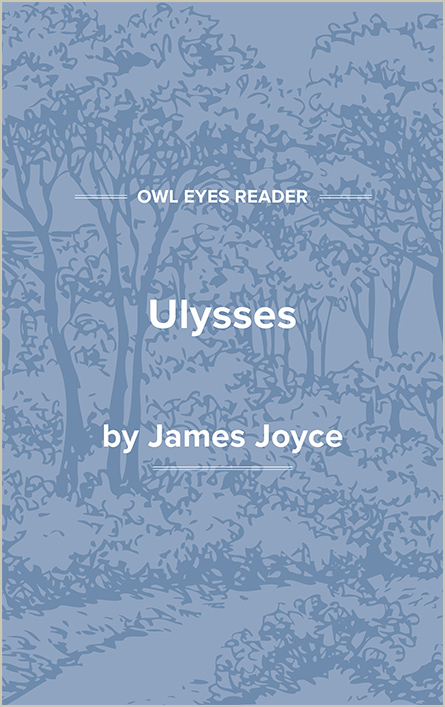Study Guide
Analysis Pages
Summary
Ulysses is based on Homer’s Odyssey (c. 725 b.c.e.; English translation, 1614) but compresses the action of the earlier epic into one day. The basic narrative of the Odyssey is maintained: Leopold Bloom, the modern counterpart to Ulysses, returns home to his wife and son and then overcomes the suitors and reclaims his place. Stephen Dedalus, the counterpart to Telemachus, needs to grow into a man and be united with his absent father.
The first section of the book, the “Telemachiad,” deals with Stephen. Stephen has returned to Ireland from Paris to face the death of his mother and is haunted by the ghost of his mother and oppressed by the demands of his real father. He needs to purge his mother’s ghost and find a new father. Stephen is oppressed, as is Telemachus, by the usurpers in the tower where he lives. Stephen’s thoughts are abstruse, philosophical, and filled with guilt; he no longer seems to be a potential artist. He wanders around Dublin in search of some relief. One noteworthy episode takes place in the National Library, where Stephen expounds his theory of William Shakespeare’s Hamlet, Prince of Denmark (pr. 1600-1601, pb. 1603), which is really a theory that is directly related to Joyce’s own life and work. Stephen also goes to visit a newspaper and tells two of the editors his short story “A Pisgah Prophecy,” which is similar to early stories in Dubliners. The proposing of a theory and creation of a literary work by Stephen is also found in A Portrait of the Artist as a Young Man. Perhaps Stephen is beginning to fulfill his claim to be a true artist.
Leopold Bloom is an ordinary man with an extraordinary curiosity about everything around him. He, like Stephen, has problems within his family. His wife, Molly, is unfaithful to him and today has received a note from the notorious Blazes Boylan telling her that he will visit her. In addition, Bloom’s son, Rudy, died fourteen years before, rendering Bloom impotent. If Stephen needs a father, Bloom needs a son. They will travel through Dublin and occasionally cross paths before their meeting and tenuous union in the last part of the book.
Bloom is a fairly complaisant husband; he never confronts Molly about Boylan and has his own deceits as a compensation. He has received a letter from Martha Clifford, with whom he is conducting an extended flirtation. On his travels, he observes and interacts with the Dubliners. The anti-Semitism and hostility against the Jewish Bloom is seen a number of times. The most important conflict he has about his Jewishness is depicted in the “Cyclops” episode, in which he defends himself forcefully against racial attacks.
The union between Bloom and Stephen begins in the “Circe” chapter. Bloom is humiliated and exalted in the chapter; he is abused by women for his weakness and oddities, while Stephen is drunk and is about to squander or...
(The entire page is 755 words.)
Owl Eyes subscribers get unlimited access to our expert annotations, analyses, and study guides on your favorite texts. Master the classics for less than $5/month!

